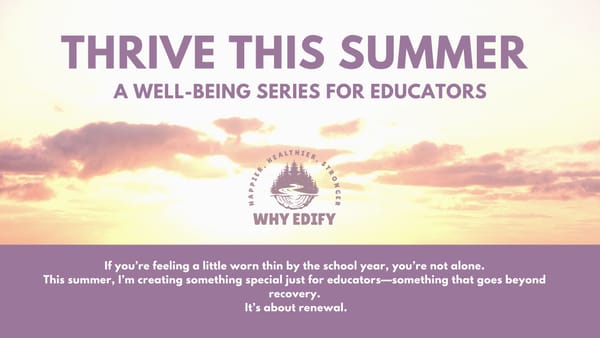Podcast Preparation - Teaching in the Digital Age: Enhancing Learning Through Project-Based Learning and Technology - A Teacher's Perspective
I was recently contacted by Magic Box to be interviewed on their podcast, titled Teaching in the Digital Age: Embracing Technology to Enhance Learning. After participating in a pre-podcast interview, they sent me a list of topics that will be covered in the episode.

Interesting things occasionally happen as a result of sending out a weekly newsletter. One of the first unexpected surprises was being approached by Eduporium for an interview, which turned into a blog post titled Teacher Talk - 8th Grade Science and PBL. This post provided me with an opportunity to clarify my thoughts surrounding my science instruction and Project-Based Learning. It also gave me an avenue to share my weekly newsletter with others.
I was recently contacted by Magic Box to be interviewed on their podcast, titled Teaching in the Digital Age: Embracing Technology to Enhance Learning. After participating in a pre-podcast interview, they sent me a list of topics that will be covered in the episode. To prepare, I thought it would be a great idea to write a post capturing my thoughts on these topics. That’s what you’ll find below.
With over 23 years of experience teaching 8th-grade science, social studies, and crew, could you share a bit about what initially inspired you to pursue a career in education?
- After high school, I initially went into business. The summer after my first year of college I went to work at a summer camp in Northern, WI. After teaching kids archery, how to sail, and taking them on canoe trips, I was hooked. After that first summer, I switched to elementary/middle education. As a side note, I learned more about working with young people after five years as a camp counselor than I did in college.
Could you give us a glimpse into the unique dynamics of your local community's educational landscape? What challenges have you encountered, and how have they influenced your teaching methods?
- My school is located in a beautiful area - a small town surrounded by trees and lakes. This location allows us to take our students on various adventures throughout the area.
- One challenge is finding new teachers and paraprofessionals. There have been very few applicants to replace our recent retirees.
- One challenge that we face is meeting the growing mental health needs of students and families. Due to the limited number of mental health professionals in our community, there is often a waiting list.
- As a result of these challenges, I have become more mindful of students' mental health needs. I have found that simple things such as regular brain breaks are effective. Additionally, I have increased my self-care efforts as my workload has increased and students have required more attention.
Can you share specific instances where you've turned obstacles into opportunities for growth, and how have these experiences contributed to your teaching philosophy?
- Increasing student needs - Teaching with Love and Logic, Choice Theory in the Classroom, looking for ways to build relationships - better at listening
- Retiring Colleagues - Been fortunate to have wonderful teaching teammates. In many ways they mentored me. Now I’m the old guy on the team which means taking on different roles and responsibilities. We rely so much on each other that it’s important we work well together. I’m trying to improve my listening and leadership skills. As I get older it’s important to me to continue to look for better ways to teach and not stagnate.
- Increased Workload - As more has been expected I’ve had to become more organized and efficient. This has led me to use a combination of technology and time management strategies to try to fit everything in.
The Future of Technology in the Education Industry
Transitioning to technology in education, it's clear that it's changing the landscape. In subjects like science and social studies, how do you envision technology's role evolving in the classroom?
- Artificial Intelligence - streamline administrative tasks, offer feedback to students, lesson plan brainstorming and creation
- Personal Instruction - Quizziz, Quizlet, - Practice retrieval where needed and offer immediate feedback. This also generates data that informs the next steps in instruction.
- Blended Learning - Station Rotation Model - allows students to move at different paces and without a teacher leaving space for small group instruction.
Shifting gears to crew teaching, how have you used this approach to enhance student engagement and their overall learning experience? Are there strategies you've found particularly effective in building a sense of community?
- EL Definition Crew - EL Education Model - It’s time set aside each day where the intent if to build relationships and help students develop their character and habits of scholarship.
- Structure of Crew - Reading, Greeting, Initiative, Debrief - Sometimes students lead it. It’s a place where teachers and students learn to support one another.
Could you share some examples of how you've integrated technology into your teaching methods to elevate the learning journey for your students?
- Use of a learning management system (Google Classroom)
- Use of online simulations - Phet - Founded in 2002 by Nobel Laureate Carl Wieman, the PhET Interactive Simulations project at the University of Colorado Boulder creates free interactive math and science simulations - gravity, energy, sound waves
- Use of formative assessment tools (Quizziz, Quizlet, Blooket, Gimkit, Flip (use to be Flipgrid) - station rotation model and The Fast and the Curious Eduprotocol
How does your personal teaching philosophy guide your strategies and interactions within the classroom?
- Learning by doing - learning is best when you do something with newly acquired skills and knowledge. It helps learning stick.
- Build both independent and collaborative work skills - both needed (science investigations and projects). There are times in life when each of these skills is important.
- Encourage kids to be curious
- Brain breaks in the classroom have two main benefits. First, they allow students to take a mental break from the task at hand, which can help them refocus and improve their attention span. Second, they provide a physical break, allowing students to move around and release energy, which can improve their overall mood and well-being.
Finding the right balance between traditional teaching methods and modern tools is key. How do you ensure your students receive a comprehensive education that combines the best of both worlds?
- Balance - Make sure students spend time learning in a variety of ways - books, direct instruction, video, online text, discussion - Taking time to make this balance happen
- Paper and Pencil - Science notebooks, sketching, and art offer a nice contrast to screens and provide unique benefits.
Closing and Advice
As we wrap up, could you share any memorable success story that highlights the positive impact education has had on your students' lives?
- Children - Having my own children in class - A unique and rewarding perspective. Helped me develop a new perspective. Watching how fantastic teachers have prepared them for each step of their education
- Confidence - As students learn more and acquire new skills their self-confidence increases. Teaching 8th grade I get to hear students reflect on their learning journey during portfolio passage presentations. They discuss lessons learned from overcoming challenges. This is one of my favorite parts of teaching.
- Community - After all of these years in the classroom I really enjoy seeing former students out in the community and listening to their stories. What are they doing now? I also get to know their kids. I feel connected to the community
Looking ahead, what are your thoughts on technology's potential to reshape the learning experience? And how do you envision educators' roles evolving in this ever-changing landscape?
- I am hopeful that technology can make many aspects of teaching easier - feedback on writing, grading, communication, more effective use of data
- This will free up time for teachers to focus on building relationships and allow for more small groups and one-on-one instruction. Once students have the right habits in place they can use technology to allow them to curate learning experiences and guide students through them.
- Personalized Learning Experiences - Helping students where they are at no matter the level from remediation to extension.
- Creators - helps kids create based on their curiosity - presentations, 3D printing, and doodling, movies, podcasts, art
P.S. - The interview felt awkward but I think it went pretty well. When it’s posted I’ll share it here.
❤ Enjoy this Post?
🍵 Show Your Support, 🛍 Shop The Store, 👕 Buy Some Swag, 🤗 Share It



